

The Fate of the Successors
Antigonos Monophthalmos (The One-Eyed
“The oldest and greatest of the Successors of
Alexander.”
Plutarch, Life of Demetrius
by Jeff Jonas
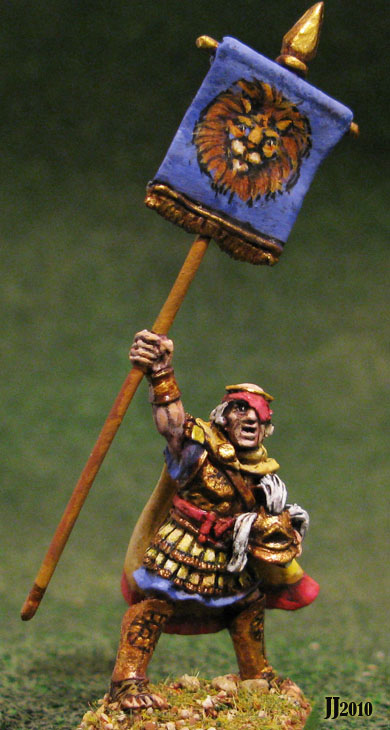
Antigonos Monophthalmos in 28mm
When my friend Jim Clarke mentioned that he was going to commission a 28mm figure of Antigonos for the Salute Hobby Show, as a promotion for Gripping Beast's Polemarch miniature range, I was certainly interested. He asked me to do a sketch of Antigonos, or come up with some references for Steve Saleh the fine sculptor of Polemarch and other collectable figures.


”Who
else should they attack, other than me?”
— Plutarch, Antigonos
One Eyed’s last words
There is no firm
known image of Antigonos, nor do we know which eye he lost. All we know is that he was old
(81) at Ipsus, and was a tall and robust man, taller than his peers. Richard Billows
speculates that the figure often associated as Parmenion on the "Alexander
Sarcophagus", possibly represents Antigonos. The reasoning being Parmenion was
disgraced when the relief was being designed, it seems unlikely that Parmenion (executed
for treason) would be part of any tributary art.
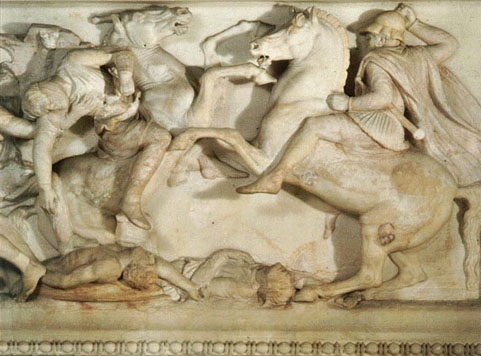
So that is a reasonable reference. When I finally got time to do a sketch, I had to rush it in during my lunch hour at work. Luckily I had most of my reference materials handy. The sketch represents Antigonos at Ipsus trying to exhort his army to hang on and await Demetrius to turn the tide.
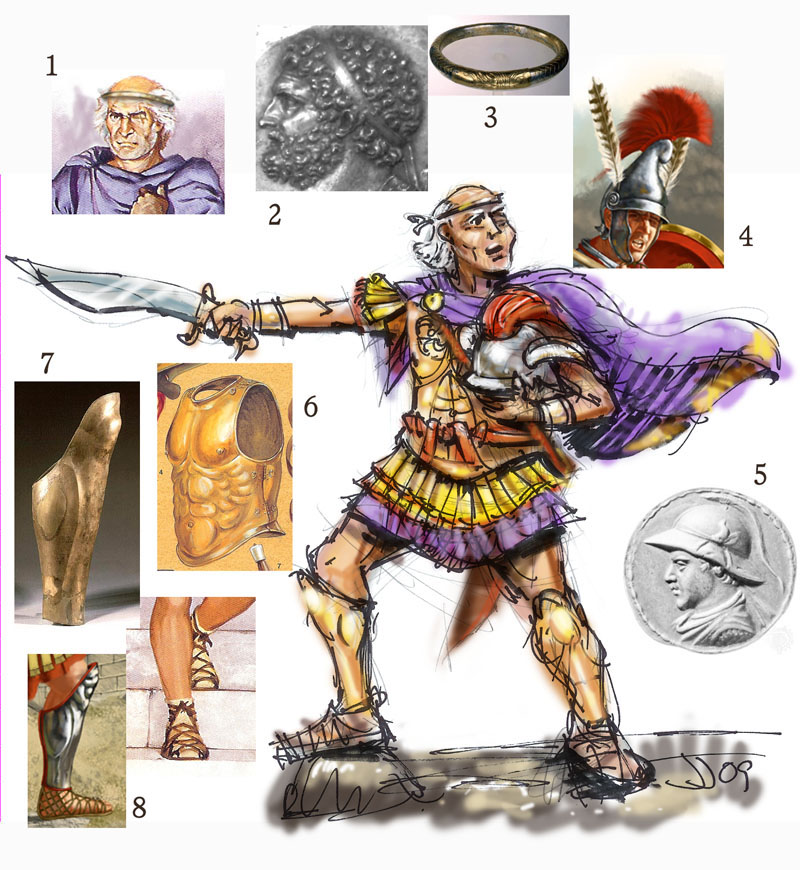
From this Mr. Saleh went to work and completed his figure. It's kind of cool, he changed the pose slightly. Sadly he chose to make the sword more pronounced than my sketch (which was a bit misleadingly large in itself).
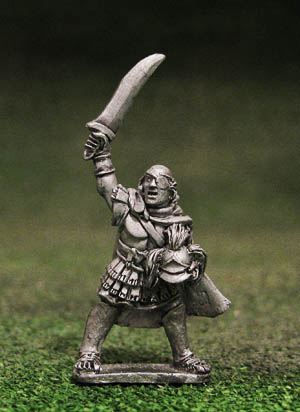
http://grippingbeast.com/webpage.php?PageID=74
The final production figure removed the diadem detail, something I felt was important. The figure sat on my desk in the painting and projects queue for some time. I decided that since I had received a number of First Corps standards, I was use one of them in lieu of the giant chopper. So I cut off the sword, and drilled out the right hand, and simply added the banner. Since I am anal and wanted this to be a king, I added the diadem with some wire shaped with round nosed wire pliers.
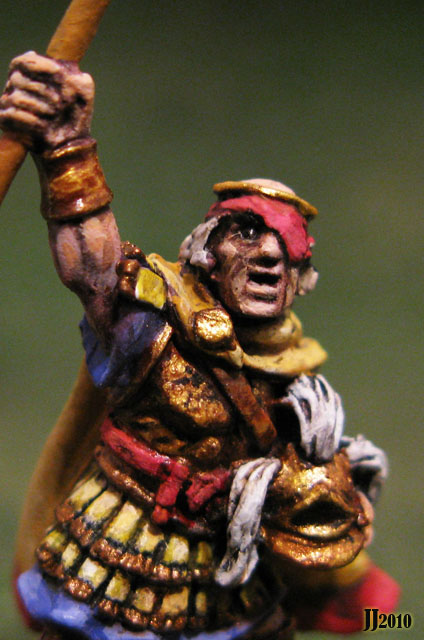

So here is old Antigonos, waiving his banner high to alert his son, "This is where I am!!"....... through the clouds of dust and between the legs of Seleucus' elephants, would Demetrius see the banner? In the end Demetrius would not see him, and would turn away, and old Antigonos went down like a Samurai in a Kurusawa epic, pin cushioned by javelins and arrows. The victors hardly paused to savor the victory as they immediately turned on themselves and fought over the spoils.
The figure was primed with flat black Krylon spray paint, and then drybrushed with white. I chose the colors of an Alexandrian Companion, just since I am more fond of these than layers of purple on top of purple. The standard's image device of a *horned lion (Sandan) is total conjecture. It was simple to paint and certainly evokes a regal theme, something different than a profile of Alexander the Great, or a Macedonian sunburst. The Hittite God Sandan was associated with Herakles, and a common Anatolian deity, and Lydian coins often had lions on them. Since Antigonos was Satrap of Lydia and eventually came to rule over all of Anatolia, it's a nice fabrication.
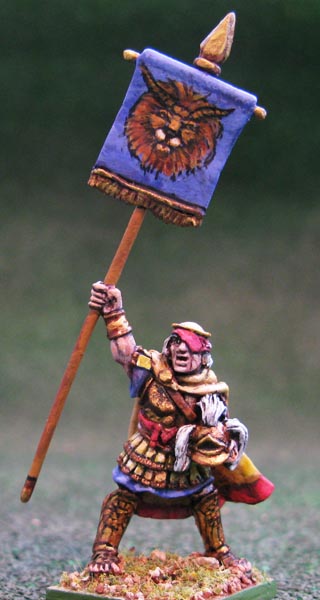
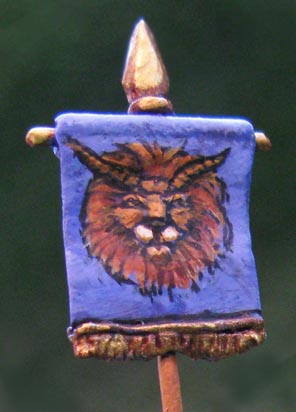
(Note this is a revised version of the banner from the one originally posted, I decided to make the horns more pronounced.. they seemed to be a bit too subtle and could be mistaken for ears.... plus it gave me a chance to diddle around with it some more, and add further details. You can choose whether it was worth "diddling with" or not!).
Sandan references:
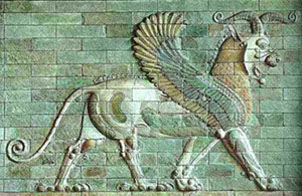 Persian Griffon horned lion |
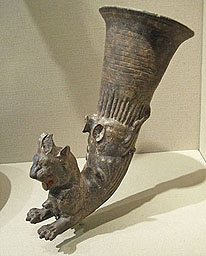 Anatolian Rhyton of horned lion 4th/3rd BC |
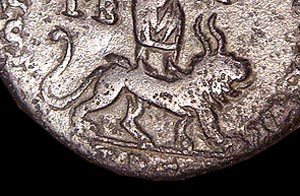 Roman Empire coin showing Sandan |
* * *
Antigonos the
General
(an excerpt from the
Macedonian Successors)
Antigonos
Monophthalmos was one of Alexander the Great's Generals, who outlived him and carved out
his own kingdom out the wreckage of the Macedonian Empire. It is generally claimed
that Antigonos was 81 years old when he was killed at the Battle of Ipsus in 301 BC; this
puts his birth date at around 382 BC. His father Phillipos served with Philip
II, Alexander the Great's brilliant father. Antigonos grew up with Philip II, and
most assuredly was a close “Companion” (hetairoi), but we know little of his
early years. We do know from snippets in various sources that Antigonos was one of
the few Macedonians with a true affection for Greek culture, and was most likely educated
in much the same way as Alexander. Antigonos probably lost his eye at the
siege of Perinthos, giving him his "One-Eyed" nickname. After
Philip’s assassination, Antigonos became one of Alexander’s close Companions,
and followed him to Asia where he was in command of Alexander's Greek mercenaries.
One-Eyed Antigonos probably served at the battle of the Granicus. As Alexander's march
continued, he needed loyal garrisons to cover the rear areas of his newly won lands with
the spear. The trustworthy Antigonos was appointed satrap (governor) of Phrygia in
333. This was an important post as one of the major tax collection points for the
Persian Empire was Sardis, a source of great revenue. Antigonos held the rear
areas against Persian counter offensives and solidified Alexander’s lines of
communications by pacifying some regions and keeping other bypassed areas under
surveillance. Eventually his successes gained him promotion. As other Macedonians
with less skills and integrity failed he was given formal control of most of the major
provinces in Asia Minor. Antigonos was in a particularly good position to solidify his
territories. Phrygia was both wealthy and centrally located; enemies would have a
difficult time concentrating against him. When the Persian general Nabarzanes
attempted to take back Lydia, Antigonos was able to defeat the larger Persian forces in
detail before they combined. He showed excellent military judgment, and developed both
administrative and political skills to govern.
Antigonos is described as a robust figure, jovial and even witty. As Richard A. Billows
relates, “To his soldiers, the stature and scarred visage of Antigonos must have
been impressive, and he evidently understood the psychological benefits of this, for he
was in the habit while on campaign of striding about making jokes and laughing in a
booming voice to instill confidence in his men.” [1]
He seemed to be a loving husband and devoted to his wife Stratonike, who bore his oldest
son Demetrius. He could be cruel, as he once executed Theokritos for making fun of
his eye, but then could turn around and make fun of himself when he joked that the writing
on a letter was large enough for a blind man to read. Another anecdote tells a
story that freezing soldiers on guard duty were complaining about Antigonos’ mental
capacity outside his tent, which they supposed was empty, Antigonos was actually in the
tent and bellowed out “You’ll be sorry if you don’t go further away to
curse me!” and left them undisciplined.
He championed Greek causes and was the first to use Greek independence as a propaganda
tool. But he was also as ruthless as any general could be in a civil war, executing his
enemies and even allies as he felt needed. His cruelty was no worse than any
other but in a civil war one must not be weak-kneed and Antigonos knew how to make
examples of his enemies. Eumenes was starved before execution, Antigenes was burned
alive in pit, and Alketas’ body was left to rot unburied. One of his cruelest
acts was to arrest and execute Peithon after he helped him win at the Battle of
Gabiene. Seleucus abided One-Eyed and stayed out of an alliance with Eumenes, but he
was rewarded by Antigonos trying to hunt him down and rub him out. Antigonos
would not tolerate other rising stars in his alliance, only his son Demetrius could share
in the glory. Once Antigonos declared himself a king the other Successors of
Alexander knew that there was to be no place for them, and their survival meant his
elimination.
As his enemies encircled his lands, Antigonos revealed that on land, or on sea he was the
most dangerous and vigorous general or admiral that came out of Alexander’s talented
corps of leaders. Whether he was leading a pitched battle, or ambushing an enemy
fleet, he was unmatched for innovation. His only major setbacks were against the
Nabataeans, when the desert expanses saved the enemy. Also, his massive attempt to
overrun Egypt fell apart because of the same bottlenecks of the Nile delta that had
thwarted Perdikkas, again saved Ptolemy.
The Battle of Ipsus
The Battle of Ipsus is one of the largest and most decisive battles of antiquity, and one
that few even know much about. Antigonos' enemies attacked him in a coordinated
offensive. Lysimachos, Ptolemy, Kassander, and Seleucus joined forces to contest all
of the empire. Ptolemy was tricked into turning back at the last minute by
Antigonos, but the other armies combined and Demetrius and Antigonos faced them in the
Spring of 301 BC on an open plain. The battle was huge in numbers not particularly
bloody or hard fought, but the results were dramatic. Demetrius and his superior
cavalry were lured away from support of Antigonos and the phalanx. Headstrong
Demetrius then pursued his foes far from the battle line. Seleucus blocked the return of
Demetrius with a wall of elephants. With his flanks turned and surrounded by masses
of Seleucus' light cavalry, Antigonos' phalanx was pinned in place. They waited for
Demetrius to return, as enemy light cavalry sniped at them, and missiles whittled down
their ranks. Eventually, as often happened in these civil wars, Antigonos' troops began to
surrender, knowing that their opponent's would often incorporate them into their own
army. Antigonos, fought till the last, never giving up on his son's return,
until he and his last loyal companions were mowed down by javelins. Demetrius and
the cavalry skulked away to Greece with mere remnants of the great army that had once
dominated Asia.
When Antigonos died at the Battle of Ipsus the dream of a unified empire disappeared as he was the last man who had a reasonable chance to do it. He began his military career in obscurity as Philip’s Companion, and rose to become King of Asia, Antigonos I. But on the morning of the battle at Ipsus, he tripped leaving his tent, and before he stood up on his old legs, he prayed for victory or death before defeat.
”Who else should they attack, other than me?”
Plutarch, Life of Demetrius
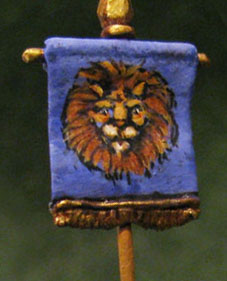
(Original banner version)
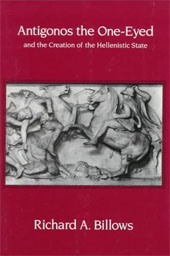 |
[1] Richard A. Billows, Antigonos the One-Eyed and the Creation
of the Hellenistic State, University of California Press, 1990 |
Questions or Comments Email:
Copyright 2010 Jeff Jonas
Back to AncientBattles.Com Home Page
03/12/10